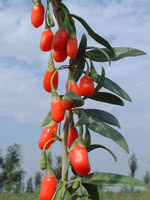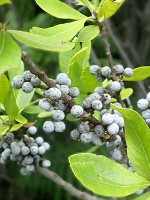Mon-Fri 9am - 5pm Mountain time
Goji Berry vs Northern Bayberry
Lycium barbarum
Myrica pensylvanica
NOT AVAILABLE THIS SEASON - MIGHT RETURN
NOT AVAILABLE THIS SEASON - MIGHT RETURN
Goji Berry is a woody, deciduous perennial known for its hearty, bright orange-red berries. It typically produces light lavender flowers from June through September, with fruit maturation taking place between August and October.
Goji Berry berries are delicious, nutrient rich, high in antioxidants, and are often called a super fruit. Many describe their flavour as being like a tart cherry tomato.
Northern Bayberry makes an excellent hedge or feature shrub. It will retain its leaves in warmer climates but drops them in colder areas. They produce blue-grey berries that have a wax coating on them that can be used to make candles or soaps.
In colder hardiness zones the leaves turn an attractive orange to red colour in the fall, making it a striking addition to your landscape.
Northern Bayberry is native to Nova Scotia and tolerates both drought and wet conditions. It is also a nitrogen fixer that tolerates poor soil conditions.
Goji Berry Quick Facts
Northern Bayberry Quick Facts
Toxicity: Warning: The wax from bayberry fruit is considered toxic and may be carcinogenic.

